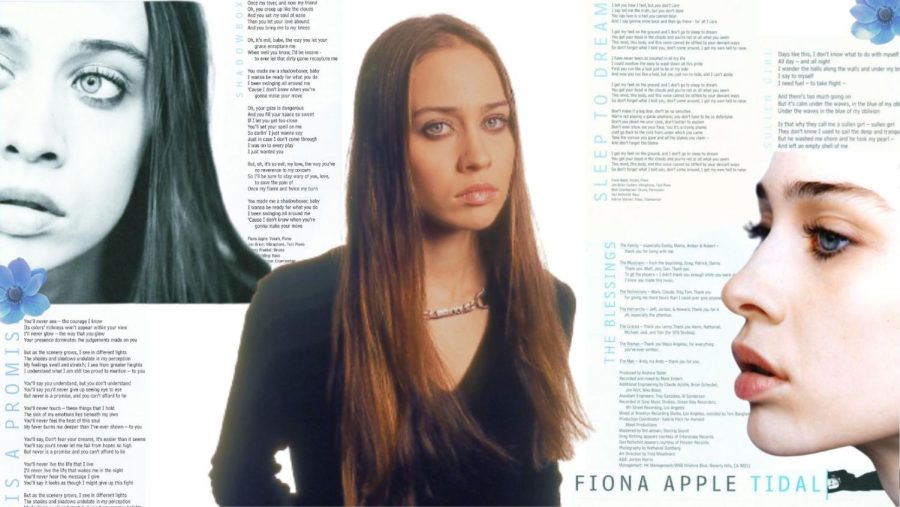Revisiting Fiona Apple’s “Tidal”
Fiona Apple, a now critically acclaimed artist and three-time Grammy award winner, released her debut album “Tidal” 26 years ago. The timeless piece encaptures a woman’s voice in her coming of age as she searches for femininity, recovery from her past traumas and sexual liberation through jazz-inspired tunes and melodic ballads. Apple stunned a new audience of listeners with her strong vocals and poetic wisdom within “Tidal”, and presented herself as an extremely daring but enigmatic artist of the 1990s. While discussion continues regarding the controversies of Apple’s earlier songs, the genius of “Tidal” continues to prevail as one of her superior works.
November 30, 2022
While creating an enormous step within the music industry, Manhattan-native musician Fiona Apple McAfee Maggart, otherwise known as Fiona Apple, started assembling her first album “Tidal” at the young age of 18. The album garnered massive attention from listeners and music labels, for the album included incredibly distinctive vocals and musicality. Apple’s unique lyrical style caused an immediate backlash against older counterparts in the entertainment industry because of her considerably mature tone. Although the singer’s debut album caused controversy, 26 years later, “Tidal” stands as an exceptionally revolutionary and inspiring musical art.
Apple pours out every emotion possible within this work. References to the trauma of her past, romantic relations, sexualization, rage, and a plethora of other sentiments flow through “Tidal” in numerous fascinating ways. While the lyricism of Apple’s work sounded like it belonged to someone of great maturity, she truthfully composed the pieces between the ages of 14 and 17. A close friend of Apple’s helped her contact the music publicist Andrew Slater, who managed Apple and produced her first album. Slater’s production and composition shined young Apple’s personality and true essence in a powerfully stirring and passionate manner.
“Tidal” starts strong with “Sleep to Dream,” which remains an exceptionally influential and demanding piece from Apple. With poetic tail rhymes and assertive demands, Apple left a lasting impression on first-time listeners. “Sleep to Dream” greatly encaptured the viewpoint of someone in a damaged relationship due to conflict of interest and lack of emotional regulation. Apple’s delivery of emotional maturity and intellect astonished listeners and critics, even during a time when she encountered backlash for the song “Criminal.”
“Criminal’s” extensively sexual lyrics and connotations did not land right with listeners. Criticism roared when audiences discovered that the singer wrote the song at an incredibly young age. In spite, Apple released a music video that left viewers speechless. Apple worked with director Mark Romanek to produce the video, but it did not come out as she intended. She formerly planned for the video to act as a tribute to her sexual guilt and liberation. Instead, the film seemed like an obscene video of a young, hardly 19-year-old girl. The music video included Apple in multiple darkly lit rooms as she undressed in the presence of several other half-undressed women and men.
“Okay, it’s about sexual guilt, fine. And all I can think is ‘I’m a teenage girl. If I’m in my underwear and everybody sees it and tells me it looks great, it makes me feel good and I’m not going to argue…’ Forget the fact that I was in my underwear; I thought that it was cheesy. I didn’t look like myself. It kind of ruined the song for me. No offense to Mark Romanek—well, I guess offense— I have total qualms about it now,” Apple said.
Within this dispute, Apple received heaps of harsh treatment. Hostile responses from first-time listeners, hateful critic reviews and sexualization from fans ran rampant within Apple’s first years as a mainstream artist. However, through all of the backlash with “Criminal,” listeners seemed to disregard the overall art of “Tidal.”
“The messages in “Tidal” are still applicable [to modern day] because even though the social norms are a lot different to how they might have been during the time of her album [the 1990s], women today still experience the same things women back then experienced, which unfortunately shows how we aren’t changing and getting justice for the mistreatment and inequality,” sophomore Camryn Zwang said.
Apple’s debut album encompassed songs such as “Sullen Girl” and “The Child Is Gone”, where Apple courageously confronts her loss of innocence through silky, but bitter ballads and somber sonnets. Likewise, the songs “Shadowboxer” and “Pale September” display the range of Apple’s fuzzy, bAut conversely robust vocals as she handles topics of losing her lover. Although some listeners and critics do not agree with her candid sentiments, especially those regarding women’s sexuality and autonomy, “Tidal” decades later still includes lessons that inspire young individuals searching for their voice through music.







